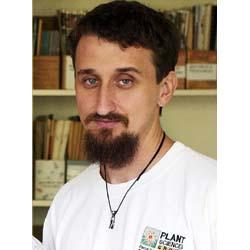Sweet smell of success could make 'effluent' researcher more affluent
Published on 08 June, 2004
Central Queensland University researcher Ben Kele’s work with the ‘bottom end of the food chain’ has paid off with the recent commercialisation of his wastewater treatment system design.
The Kele Effluent and Wastewater Treatment System (KEWT) is a unique system for the treatment of wastewater and effluent which is now be marketed by GBG Project Management ( www.gbgprojects.com ).
KEWT uses a mixture of biological treatment systems and reuses effluent through a self-contained recirculatory form of sub-surface irrigation.
 The concept is derived around a system of underground filter beds, connected by pipes within concrete pots that supply water and nutrients to vegetations grown over the channels. The filter beds are planted with a series of native plants, tropical fruit trees and bamboos, which further treat the effluent through rhizofiltration. The plants use the treated effluent as a source of water and the nutrients inherent in the effluent as fertilizer.
The concept is derived around a system of underground filter beds, connected by pipes within concrete pots that supply water and nutrients to vegetations grown over the channels. The filter beds are planted with a series of native plants, tropical fruit trees and bamboos, which further treat the effluent through rhizofiltration. The plants use the treated effluent as a source of water and the nutrients inherent in the effluent as fertilizer.
With additional treatment stages the system can be used for aboveground reuse purposes, such as toilet flushing and firefighting.
The system has been tested at a number of sites throughout Queensland over the past five years and has proven extremely successful.
The system can be used for domestic purposes, however it is extremely beneficial environmentally and economically where the site is being used for 30 or more people.
KEWT can be retrofitted to existing structures or designed specifically for new infrastructures and there is minimal maintenance needed, compared to alternative systems.
With the help and support of the staff at CQU’s Plant Sciences Research Group, Mr Kele has been able to adapt known treatment systems and develop and refine contained reuse systems that are completely environmentally friendly.
The system is quickly gaining the recognition it deserves from councils, governments, environmental groups and the water industry.
Mr Kele has 15 years’ practical experience in the manufacture of onsite wastewater systems and five years’ experience in the study and installation of biological treatment and reuse systems.
“The system is unique because it combines different types of biofilters within a recirculating evapotranspiration bed. This allows the system to have a relatively high level of treatment combined with a robust resistance to large surges of wastewater,” he said. “Many of the existing technologies fail to consistently meet the performance guidelines for public and environmental health. The inspiration behind the system was to design a technology that meets the performance guidelines under most operating conditions. “The future of the system lies in the commercial/industrial or cluster residential. The system is most economic when used at sites larger than the average domestic household. Tourist developments; especially ecotourism, clusters of residential houses, island developments, etc are all potential applications for the technology.”.
Mr Kele said future research will focus on new substrate combinations for the biofilters, improved channel design, and plant selection.
For details call Ben Kele on 4923 2023 or 0407 268 069 or via b.kele@cqu.edu.au

